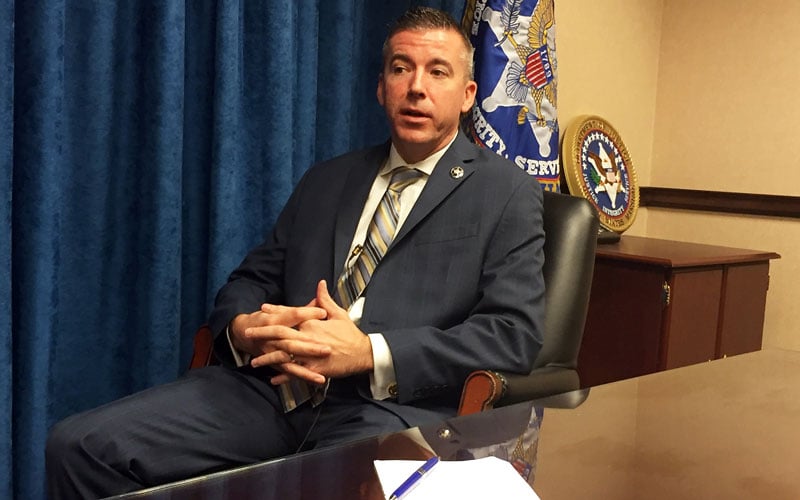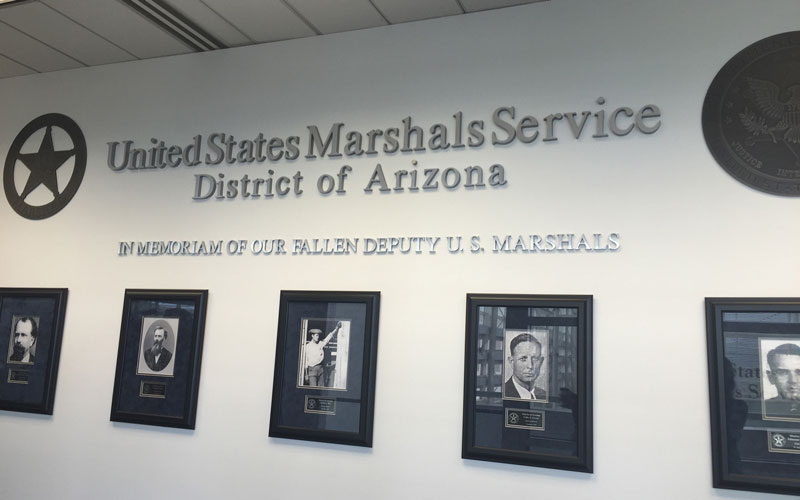
Matt Hershey, assistant chief deputy of the U.S. Marshals Service for the district of Arizona, discusses the effort to track down almost 200 unregistered sex offenders. (Photo by Becca Smouse/Cronkite News)

The U.S. Marshals Service is part of a task force that also includes the Maricopa County Attorney’s Office and the Phoenix Police Department.(Photo by Becca Smouse/Cronkite News)
State officials are looking for just under 200 sex offenders who have failed to register with the Arizona Department of Safety, according to the county attorney general’s office.
A task force comprised of the Maricopa County Attorney’s Office, the U.S. Marshals Service and the Phoenix Police Department is tracking down 191 unregistered sex offenders.
“These are potentially dangerous sexual predators who tried to blend into the community and escape the consequences of their criminal behavior,” Maricopa County Attorney Bill Montgomery said in a statement.
Arizona law states that those convicted of sexual assault crimes must register as an offender within 10 days of their conviction. Those who fail to register can be charged with a Class 4 felony.
Diane Grenco, owner and director of sexual abuse therapy service AZ Center for Change, said there are a number of reasons offenders fail to register with the state, including restrictive housing and limited job opportunities.
“There are a lot of things they have to live with,” Grenco said. “Sometimes they think it is better for them to leave the area and try to live under the radar so they don’t have to follow these restrictions.”
Grenco said Maricopa County’s numbers of unregistered offenders is not alarming considering the amount of sex offenses committed in the state. Currently, Arizona has more than 15,000 registered sex offenders, according to the Arizona Department of Safety.
However, Grenco said studies are now showing registration for sex offenders ineffectively reduces recidivism. She said registration was intended for high profile cases, but now includes all sex crimes.
“Some of the research is showing a counterproductive effect with it,” Grenco said. “It sometimes can give the community a false sense of security.”
Matt Hershey, assistant chief deputy U.S. Marshals Service for the district of Arizona, said the Adam Walsh Child Protection and Safety Act, which passed in 2006, is the reason for the strict laws.
The Adam Walsh act, named for a 6-year-old boy who was abducted in Florida in 1981, created consistent punishment for sex offenders across the nation, including registration. Hershey said the act prevents offenders from evading corrections by fleeing their state.
“We’re actively going after those who are not complying,” Hershey said.
Hershey said deputies and officers are dedicated to arresting unregistered sex offenders. This team attempts to serve warrants every day.
“You never want to see someone victimized in a sexual manner,” Hershey said. “Those are the important cases.”
The task force, a component of the Marshals’ violent offender force, has made 70 arrests, Hershey said. The force works year-round, implementing extra bursts of force throughout the year.
“We hope that all registered sex offenders are where they are supposed to be, but obviously that isn’t always the case,” Hershey said.